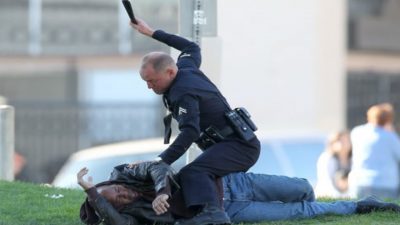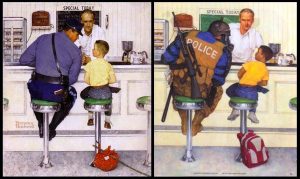
The keys to the federal courthouse is something call “federal question jurisdiction“. “Federal question jurisdiction” entitles a person whose federal constitutional rights were violated by persons acting “under the color of state law”, to sue under federal law, including in federal court itself, for redress. A typical situation involves a peace officer (i.e. deputy sheriff, police officer) violating the federal Constitutional rights of a civilian by using unreasonable force upon them and/or by falsely arresting them, and thereafter procuring their malicious criminal prosecution; today’s norm.)
The federal court venue was traditionally very important to the enforcement of the Fourteenth Amendment, because black persons of African descent couldn’t get a fair trial in Southern state Superior Courts following the Civil War (that ended in late April of 1865.) Although starting-out as a Post-Civil War Southern “social organization”, the “Ku Klux Klan” soon became the local Southern “Sheriff and his deputized posse”, who terrorized and murdered black persons of African descent while acting “under the color of state law”; under the authority of the Sheriff.
Imagine a “black widow” (not the spider type) suing the local Sheriff and his posse members for murdering her husband in a Post-Civil War Southern state Superior Court, where the judge and the jury members were either part of the murdering mob, or relatives and friends of those who were. Unless black persons had a remedy in a United States District Court, as a practical matter they had no remedy at all.
The 14th Amendment grants citizenship to “all persons born or naturalized in the United States,” including and especially former slaves who had been “freed” with the ratification of the 13th Amendment (abolishing slavery) by the states on December 6, 1865.
The 14th Amendment had been rejected by most Southern states, but was ratified by the required three-fourths of the states on July 28, 1868. Known as the “Reconstruction Amendment,” it makes any former slaves who were born in the United States, citizens, and forbids any state to deny any person (especially former slaves) “life, liberty or property, without due process of law” or to “deny to any person within its jurisdiction the equal protection of the laws.”

Thereafter, in response to a letter to Congress from President Ulysses S. Grant, complaining of the conditions in the Southern states, on April 20, 1871 Congress enacted the the statute that we sue police officers under to this very day; The Ku Klux Klan Act of 1871; 42 U.S.C.§ 1983. Also known as the “Third Enforcement Act”, Congress enacted Section 1983 to enforce the 14th Amendment; at that time to provide black persons of African descent with a civil remedy for damages in federal court against “the Sheriff” and his posse, who were ”acting under the color of state law” when they violated their victims’ federal constitutional rights (i.e. murdering black people in the South and otherwise terrorizing them. This is the very same law that we sue police officers under to this very day.
The Third Enforcement Act, also known as The Ku Klux Klan Act of 1871 and 42 U.S.C. § 1983 provides:
“Every person who, under color of any statute, ordinance, regulation, custom, or usage, of any State or Territory or the District of Columbia, subjects, or causes to be subjected, any citizen of the United States or other person within the jurisdiction thereof to the deprivation of any rights, privileges, or immunities secured by the Constitution and laws, shall be liable to the party injured in an action at law, suit in equity, or other proper proceeding for redress, except that in any action brought against a judicial officer for an act or omission taken in such officer’s judicial capacity, injunctive relief shall not be granted unless a declaratory decree was violated or declaratory relief was unavailable.”
Although the original immediate class of persons that the 14th Amendment was ratified to protect were black persons of African descent, those protections of the 14th Amendment apply to all persons.
Mr. Steering has been suing police officers and deputy sheriffs under 42 U.S.C. § 1983 since 1984. When the state or local police violate your federal constitutional rights (that, by the way, are shrinking by the day), a Section 1983 action is your federal civil remedy, along with any state law remedies permitted in the state where the police abuse occurred.
If you want to know what do to if you’ve been falsely arrested, retaliated against for exercise of your constitutional rights, beaten-up by the police or maliciously prosecuted, please contact us at (949) 474-1849 or jerrysteering@yahoo.com. Thank you for visiting with us, and best of luck. Even if you have a legal question that’s important to you, and you just need lawyer input, we’ll be glad to answer your questions.
Thank you again for visiting with us.
Jerry L. Steering, Esq., Suing Bad Cops And Defending Bogus Criminal Cases Since 1984
What to Do If You Have Been Falsely Arrested or Beaten-up by the Police – Click Here
 Click on “Home“, above, or the other pages shown, for the information or assistance that we can provide for you. If you need to speak with a lawyer about your particular legal situation, please call the Law Offices of Jerry L. Steering for a free telephone consultation.
Click on “Home“, above, or the other pages shown, for the information or assistance that we can provide for you. If you need to speak with a lawyer about your particular legal situation, please call the Law Offices of Jerry L. Steering for a free telephone consultation.
Law Offices of Jerry L. Steering, 4063 Birch Street, Suite 100, Newport Beach, CA 92660; (949) 474-1849; Fax: (949) 474-1883; email: jerrysteering@yahoo.com
Jerry L. Steering with Diane Sawyer, Co-counsel* Bob Dole, and former partner** Melvin M. Belli






